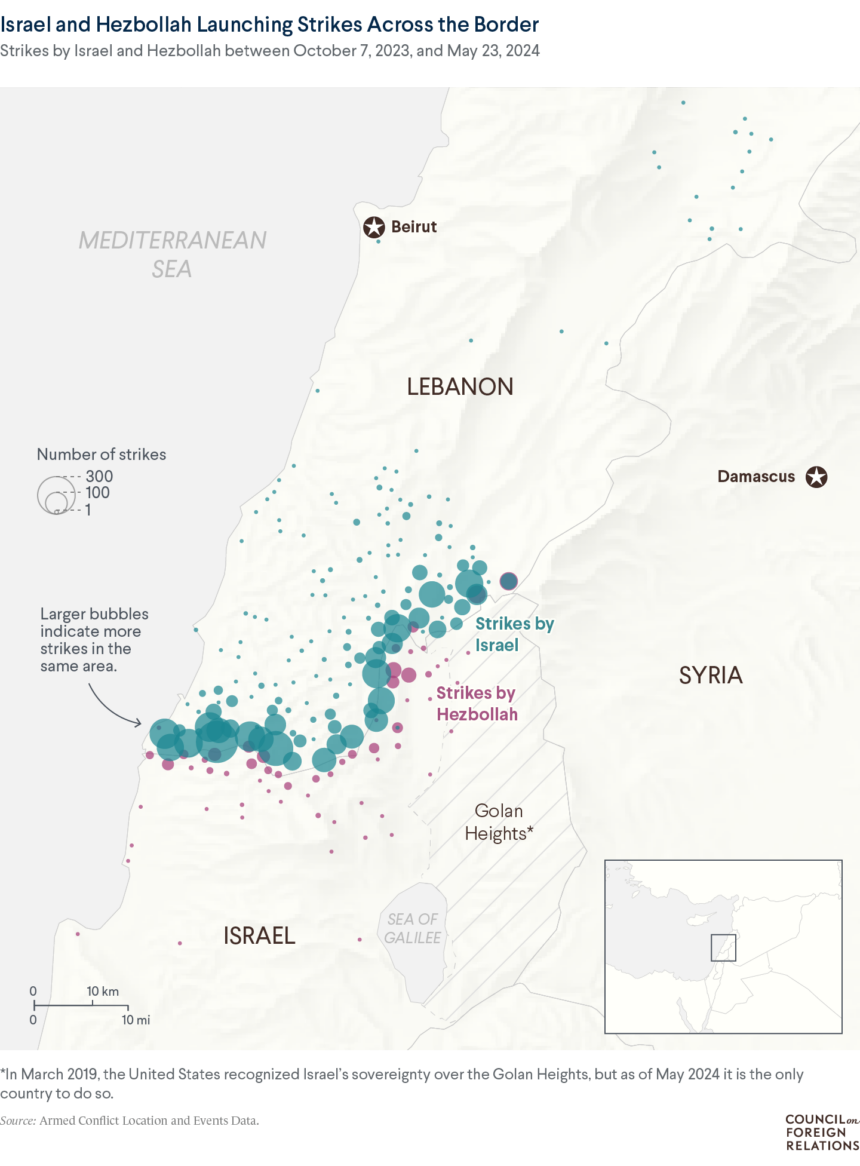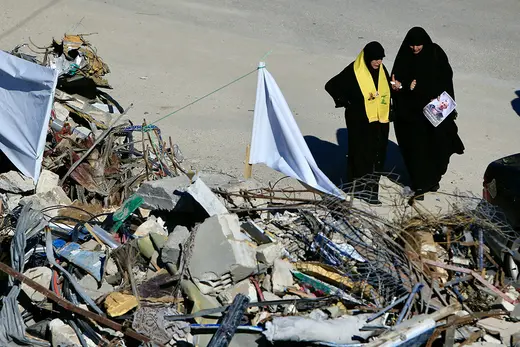The war in the Gaza Strip has fueled regular border clashes between Israel and the Lebanese group Hezbollah, whose backing from Iran has spurred concerns about a major regionwide escalation. Israel and Hezbollah have a history of conflict going back more than four decades, and Lebanon has remained a frail state throughout that time.
Hezbollah and Israel have exchanged near-daily strikes since Hamas’s October 7, 2023, attack on Israel, affecting civilians on both sides of the border. By mid-May 2024, the attacks had displaced almost ninety thousand people in Lebanon and sixty thousand in Israel. Of the approximately 350 people killed in Lebanon since October 7, more than 50 have been civilians and the rest Hezbollah fighters. The Israeli death toll is about twenty people, at least a dozen of them soldiers.
Hezbollah’s involvement in the conflict has added further stress on Lebanon’s already crumbling economy, which for years has been suffering its worst crisis since the 1975–90 civil war. In February, Economy Minister Amin Salam said the fighting will cause an annual growth decline between 2 and 4 percent and likely drive down crucial tourism revenue.
Hezbollah says it is fighting Israel in support of Palestinians, while its critics claim the strikes serve Iran’s interests. “In recent years, Hezbollah has become an expeditionary force for Iran’s Islamic Revolutionary Guard Corps (IRGC),” CFR expert Steven A. Cook writes. For instance, in mid-April, Hezbollah launched dozens of rockets into northern Israel to accompany strikes Iran had fired in its first-ever attack on Israel, which came in response to an Israeli strike on an IRGC facility located at the Iranian Embassy’s compound in Syria. Yet in a May 13 statement, Hezbollah leader Hassan Nasrallah stated that Israelis who have evacuated due to the clashes will remain displaced as long as the war in Gaza continues, signaling that Hezbollah would bring calm to the Israel-Lebanon border if a cease-fire in Gaza is agreed on. Analysts such as Cook say that this is possible, but the escalatory risk then falls upon Israel, which has demanded that Hezbollah also withdraw from the border. Experts say Hezbollah’s cooperation cannot be guaranteed.
Lebanon-Israel relations were fraught well before the current fighting, stretching back to Israel’s war against Hezbollah in 2006 and its intervention in the 1975–90 Lebanese Civil War. The Lebanese Civil War killed more than 150,000 people and highlighted Lebanon’s socioeconomic disparities, identity politics, and unequal distribution of power. Against the background of those problems was the Palestine question, whose significance in Lebanese politics stems partly from the need to address the large Palestinian refugee population that has resided in Lebanon since 1948. Israel further complicated the conflict in 1982 by invading Lebanon with the intention of eliminating the Palestine Liberation Organization (PLO) which, at the time, was operating in Beirut.

A group of Lebanese Shiite Muslim clerics founded Hezbollah to fight the Israelis, adopting an organizational model that Iran had sought to proliferate in the region after its 1979 Islamic Revolution. Hezbollah was one of many armed groups to emerge during the civil war; Christians, Sunni Muslims, secular Arab nationalists, and Shiites not affiliated with Hezbollah also fielded armed groups. Among the most notorious was the militia associated with the Kataeb Party—known commonly as the Phalangists—which represented Lebanon’s traditional Maronite Christian elite. In 1982, the Phalangists aligned themselves with Israel in one of the worst incidents of the conflict, massacring an estimated 700 to 3500 Palestinians in the Sabra and Shatila refugee camps in southwest Beirut as the Israelis looked on.
Though the civil war ended in 1990, internal strife continues to mark Lebanese politics. The country’s major ethnic and religious groups still view each other with mistrust, and a majority of Lebanese hold unfavorable views of Iran, Hezbollah’s primary patron. Yet Hezbollah has become a fixture of Lebanese politics, with its political arm serving in every government since 2005. More recently, Hezbollah has garnered popular support during the country’s economic malaise by providing public services the state has failed to offer.
Hezbollah Antagonizes Israel
Like Iran, Hezbollah explicitly opposes Israel. In July 2006, Hezbollah abducted two Israeli soldiers and killed several others at the border, seeking to use the Israeli soldiers as bargaining chips to secure the release of Lebanese prisoners in Israel. In response, Israel and Hezbollah engaged in a thirty-three-day war that killed 1,200 Lebanese and 159 Israelis. In the years before this war, Iran had supplied Hezbollah with numerous weapons, as well as the know-how and equipment for Hezbollah to produce its own arsenal. Iran continues to provide this support today, and analysts estimate that Hezbollah has as many as 150,000 rockets and missiles that can threaten Israel.
A maritime border agreement signed in October 2022 marked one of the first diplomatic interactions between Israel and Lebanon since the 2006 war. Despite its animosity toward Israel, Hezbollah agreed to abide by whatever the Lebanese government decided with the Israelis. However, the group did threaten to attack an Israel-linked gas rig if it began production before a deal was struck. Experts say this episode underscores the political power Hezbollah has within Lebanon. As such, the chances of normalization between Israel and Lebanon remain slim.
Will Merrow and Michael Bricknell created the graphics for this In Brief.
By Christina Bour
Source: Council on Foreign Relations (CFR)








